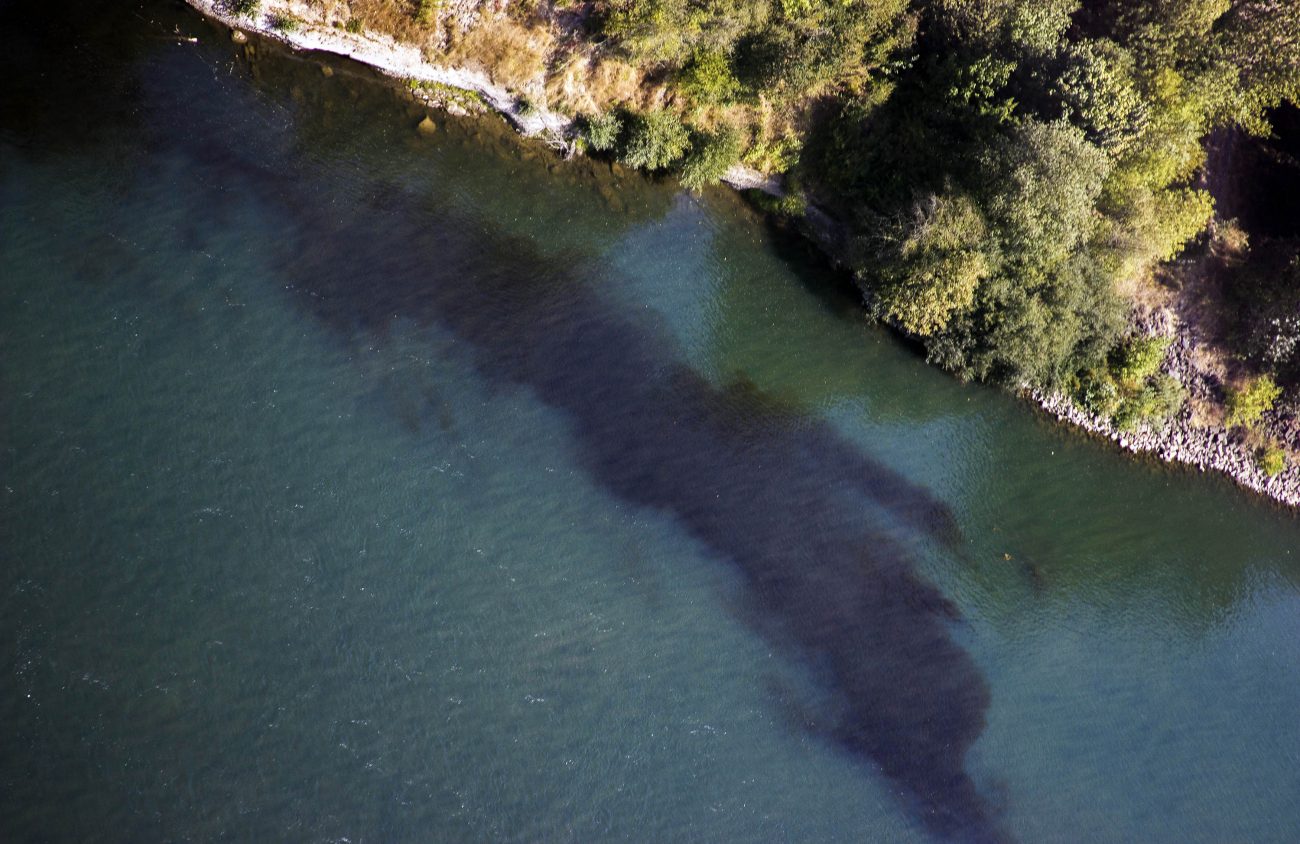To his knowledge, river guide Aaron Helfrich was the first person to find and report the oil spill in the McKenzie River from Springfield paper mill International Paper last month. He says there may be more beneath the surface of that incident than originally reported.
Five hours elapsed between the time International Paper was made aware of the spill and when it reported the incident to Oregon Emergency Response. Community members assert that this delay calls attention to the fact that companies themselves bear the responsibility to self-report incidents that have the potential to put the river, and the whole city’s water, at risk.
Helfrich was out near the river March 13, “and there was a noticeable sheen on the water at the Harvest Lane boat ramp,” he tells Eugene Weekly in an email.
“I went upstream, and it got worse,” Helfrich says. “I called Jeff Ziller at ODFW and informed him.”
Ziller is a fish biologist at Oregon Department of Fish and Wildlife. Helfrich says he called in the spill to Ziller at around 1 pm on March 13, and from there, Ziller tells EW, the biologist immediately alerted International Paper.
But according to a press release from the Oregon Department of Environmental Quality (DEQ), International Paper didn’t report the oil spill to Oregon Emergency Response until 5:50 pm that same day.
This delay could increase whatever fines or enforcement actions International Paper is currently facing, says Don Hanson, DEQ’s western region cleanup and emergency response manager.
“Obviously discharging oil to the river is a violation,” Hanson says. “So there will be some type of enforcement taken.” He continues: “How quickly a company responds is usually taken into consideration.”
The initial press release from DEQ says International Paper estimated “200 gallons [of hydraulic oil] were released.” ODFW’s Ziller says there is no way to know whether that number is accurate.
“A source from DEQ was looking into it, and they were trying to figure out the volume of what went into there, and the initial indication was about 200 gallons but it was hard to know,” Ziller says. “They thought it was over 200 gallons but under 1,000.” Ziller continues, “Most people know that it was at least 200 gallons and it may have been more.”
According to Katherine Benenati, DEQ’s western region public affairs specialist, on March 21 International Paper revised its estimate of the spill volume at the paper machine to up to 1,000 gallons. “Of that amount, we don’t know how much went into the pipe (although early estimates put that at around 200 gallons) and how much spilled onto the ground or went into the wastewater lagoons at the site,” Benenati says. The lagoons are manmade ponds that collect wastewater for treatment.
Benenati says, “On March 22, IP reported to DEQ that 304 gallons of oil/water emulsion had been recovered from the 42-inch pipe during cleanout procedures. At this point it is unknown exactly how much of the oil made its way to the river.”
Along with discovering the oil spill, Helfrich says he was challenged by what he took to be security officials near International Paper a few days after the incident.
“There were three people there, and they were very concerned that I was there,” Helfrich says. “I walked up to the mouth of the Mohawk and was verbally confronted, saying I could not be there. I was on public land and not interfering in any way with their operations.”
Helfrich says he thinks the people who confronted him at the scene near the confluence of the Mohawk River and the McKenzie “were hiding something.”
International Paper’s communications specialist Michelle Winetrout says via email that the company “did not have any security working around the river or especially hired at the time of the spill. There was a heavy presence of DEQ, fire, police, etc. on hand to keep the public safe and informed during the closed time periods of the river and boat ramps.”
Helfrich says the people who confronted him were in plain clothes, not in any particular uniforms.
EW reached out to Clean Harbors, a company focused on a “broad range of services such as end-to-end waste management” and “emergency spill response,” according to its website, about what Helfrich says he saw.
“We can confirm that we assisted in the McKenzie River spill containment and cleanup,” Clean Harbor’s Vice President of Corporate Communications David Proud says. “However, because of our contractual obligations to our customer, we cannot provide any additional information.”
Although this was the first incident of this nature to occur with International Paper, the mill itself — located on 42nd Street in Springfield — has been operating for decades. International Paper bought the Springfield mill from Weyerhaeuser in 2008, according to Weyerhaeuser’s website.
Weyerhaeuser has had other contaminations in the past. Diesel was released from a tank into soil and groundwater in 1990, according to DEQ records, and a similar spill went into the McKenzie River in 1973, according to The Register-Guard.
“It’s really an unfortunate incident,” says EWEB board President John Brown of last month’s spill. “This isn’t the first time and it’s been going on for decades,” he adds, referencing Weyerhaeuser. “I hope they’ll figure out a way to stop this.” Brown adds, “What’s the motivation to prevent this from happening in the future?”
The cause of this particular spill, DEQ says, has been reported as a malfunction of faulty equipment from International Paper. “We don’t know a lot of details about the actual piece of machinery and how the oil got out of it,” Hanson says. “All we know is that it got out and then it made its way into this pipe that made its way directly into the McKenzie.”
It’s on the company to both prevent contaminations and self-report them when they happen, Hanson says. International Paper sends in monthly reports to DEQ monitoring various parameters, such as water temperature and pH, and DEQ inspects the company’s wastewater system every two years, DEQ’s Benenati says.
The last inspection was Jan. 11, according to DEQ records. The internal machinery of the mill had nothing to do with that inspection, Hanson says, as the wastewater inspection happens outside of the facility and DEQ only inspects what the permit entails.
“It’s kind of up to them to maintain a facility that is operating properly, and if they have an incident they report it and they’re responsible for it,” he says.
The spill has been contained, and oil booms are now set up to collect residual fluid, but Helfrich says he’s still worried for aquatic life.
“Several folks told me the oil is on the surface but won’t hurt anything,” Helfrich says, but “we have tremendous bug hatches this time of year. These aquatic insects get covered by oil then eaten by fish. Oil also coats our aquatic mammals.”
Since responsibility lies on companies, like International Paper, to maintain their own equipment and self-report their mistakes, everyday citizens may feel helpless in protecting themselves and their environment, but EWEB’s Water Quality and Source Protection supervisor Karl Morgenstern says those everyday people can play a big role in keeping our watershed healthy.
“This spill was reported by a fisherman,” Morgenstern says, “so yes, it is very helpful when community members see something that does not appear right to report it.”
A Note From the Publisher

Dear Readers,
The last two years have been some of the hardest in Eugene Weekly’s 43 years. There were moments when keeping the paper alive felt uncertain. And yet, here we are — still publishing, still investigating, still showing up every week.
That’s because of you!
Not just because of financial support (though that matters enormously), but because of the emails, notes, conversations, encouragement and ideas you shared along the way. You reminded us why this paper exists and who it’s for.
Listening to readers has always been at the heart of Eugene Weekly. This year, that meant launching our popular weekly Activist Alert column, after many of you told us there was no single, reliable place to find information about rallies, meetings and ways to get involved. You asked. We responded.
We’ve also continued to deepen the coverage that sets Eugene Weekly apart, including our in-depth reporting on local real estate development through Bricks & Mortar — digging into what’s being built, who’s behind it and how those decisions shape our community.
And, of course, we’ve continued to bring you the stories and features many of you depend on: investigations and local government reporting, arts and culture coverage, sudoku and crossword puzzles, Savage Love, and our extensive community events calendar. We feature award-winning stories by University of Oregon student reporters getting real world journalism experience. All free. In print and online.
None of this happens by accident. It happens because readers step up and say: this matters.
As we head into a new year, please consider supporting Eugene Weekly if you’re able. Every dollar helps keep us digging, questioning, celebrating — and yes, occasionally annoying exactly the right people. We consider that a public service.
Thank you for standing with us!

Publisher
Eugene Weekly
P.S. If you’d like to talk about supporting EW, I’d love to hear from you!
jody@eugeneweekly.com
(541) 484-0519
